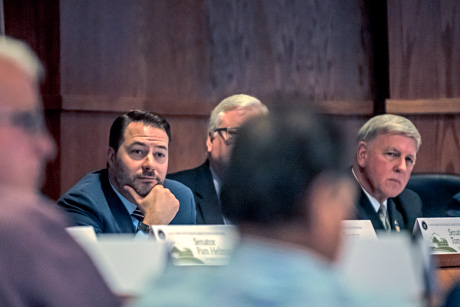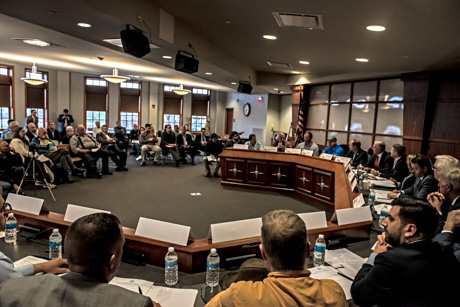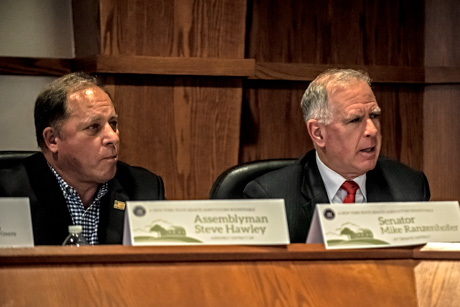Reactions to Senate passage of farm labor bill, which now heads to the governor for signature
From Senator Michael Ranzenhofer:
The New York State Senate passed the “Farm Workers Bill.” State Senator Michael H. Ranzenhofer (R-C-I, Amherst) voted against it.
Senator Ranzenhofer has issued the following statement:
“Today’s passage of the Farm Workers Bill is devastating to our local farms. It does not take into consideration the economic and practical realities of farming. I have heard from and met with both farmers and farm workers who have shared the crippling impact this legislation would have on them.
“This is just another example of Downstate legislators who do not understand the Upstate economy. This will impose hundreds of millions of dollars in mandates onto farms who are already struggling. Simply put, it is going to eliminate jobs and put farms out of business.
“Furthermore, I am disappointed that such a critical bill would be introduced at the last minute and not ever be considered by the Senate Agriculture Committee or reviewed by the public.”
From Senator Rob Ortt, ranking minority member of the Senate Agriculture Committee:
“Tonight’s passage of the Farmworker Labor Act is disappointing and further displays the disconnect between state Democrats and Western New Yorkers. For months, I toured farms across western New York and spoke about this legislation with hundreds of workers, employees and community residents.
Employers and employees alike pleaded that this bill would destroy small family farms. With New York State farm closure rates already triple the national average, this legislation will grow the closure rate and devastate the number one economic driver in New York.
My chief concern when Democrats took over the entirety of state government was that Upstate would be ignored. Incredibly, it has gone further than that and Upstate is now being attacked by radical New York City regressives. Their willing accomplices include Democrats from the rest of the state, the Business Council, and the State Farm Bureau, who – sadly – should have all known better.
From Gov. Andrew Cuomo:
"My administration has proudly fought for working men and women across the board, from raising the minimum wage to strengthening worker protections in nail salons and the home healthcare industry. We believe all workers deserve to be treated with dignity and respect -- period.
"Over the weekend, I issued a reformed farm workers bill of rights, which guarantees farm workers will finally be granted basic rights to protect them from abusive and exploitive working conditions.
"With the passage of this legislation, we will help ensure every farm worker receives the overtime pay and fair working conditions they deserve. The constitutional principles of equality, fairness and due process should apply to all of us. I am proud that, with the help of my daughters' years-long advocacy on this critical issue, we got it done."
From Grow NY Farms:
For months, New York’s agriculture community worked with a purpose to meet a fundamental goal of developing farm labor legislation that would protect the combined interests of farms and farm workers. We negotiated in good faith with many majority lawmakers who were interested in hearing from those who would be directly impacted by the legislation.
Political realities meant we had to come to find a middle ground that was mutually beneficial.
We thought we had achieved that goal with a bill that while posing significant challenges for a struggling Industry, it was a vast improvement than where we started. Unfortunately, there were some flaws thrown into the legislation in the final days of this legislative session that made the bill unacceptable. Despite the passage of this flawed legislation (S.6578/A.8419), we have not given up on finding a way to fix those flaws.
These flaws include:
1. A requirement that wages paid on the seventh consecutive day of work – are based on an overtime rate -- if a farmworker waives their right to a day of rest.
2. The definition of family fails to recognize the role of close relatives such as aunts, uncles, nieces, nephews and cousins – and would make their participation in farm activities subject to the new statute.
3. The creation of a wage board lacks New York’s key agency expert on agricultural issues – the State Commissioner of the Department of Agriculture and Markets.
4. Elections involving the ability to form a union lack the integrity of a secret ballot.
At this time, we believe it is in the interest of all parties to continue working together to address these flaws and move forward with legislation that farmers, farm workers and the labor community can mutually embrace and reflect the spirit of the dialogue and discussion that has taken place in recent months.
It is also important to note the significant role played by all the farmers, farm workers and lawmakers who worked to build consensus on this issue.
Grow NY Farms represents a coalition of more than 50 New York farms, organizations, and local businesses. To learn more, visit www.GrowNYFarms.com.



